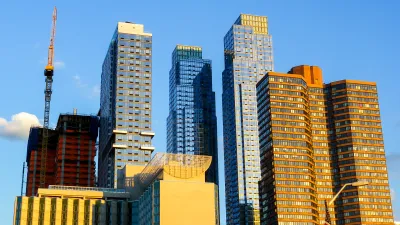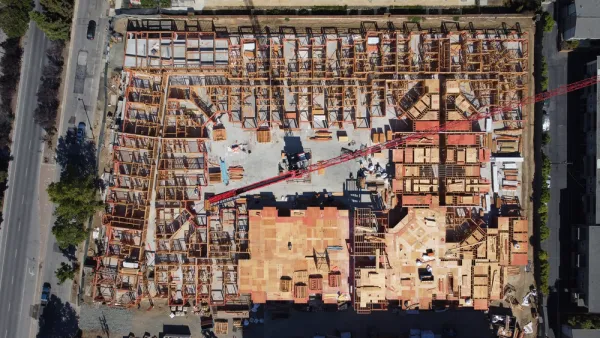Urbanist Richard Florida assesses post-pandemic possibilities for neighborhoods that once relied on 9-to-5 workers.

While other parts of cities are "springing back to life" as we shift to a post-pandemic society, "[t]he ongoing shift to remote work challenges the historic role of the Central Business Districts," writes Richard Florida in Bloomberg CityLab. Unlike museums, restaurants, and concert venues, corporate towers are not experiencing an ebullient resurgence but rather an existential crisis.
"These signature skyscraper and corporate tower districts that define the skylines of great cities, and are often synonymous with downtowns, will have to adapt. But far from killing them off, the shift to remote work will ultimately change their form and function in more subtle ways." CBDs, argues Florida, "are perfectly positioned to be remade as more vibrant neighborhoods where people can live and play as well as work — a leading-edge example of what many urbanists are now calling 15-minute neighborhoods."
To Florida, "[t]he biggest and most enduring change in our economic geography ushered in by the pandemic turns out to be far less in where and how we live, and much more about how and where we work." Business districts have recovered more slowly than other sectors, indicating a reluctance on the part of workers to return to the office despite increased vaccination rates. "It’s likely not just the fear of offices per se, but the fear of getting to and from them that remains a fundamental challenge," writes Florida. "Even as suburban office parks where people can drive to work begin to fill up, CBD office districts remain far emptier."
The decline of business in CBDs will have a powerful impact on service sector jobs. "Downtown expert Paul Levy estimates that every 500,000 square feet of occupied office space in the CBD creates jobs for 18 cleaning personnel, 12 security staff and 5 building engineers." But Florida argues that these neighborhoods have too many good qualities to simply fall into economic decline. "Their locations are just too good — too central, too dense, and with too much infrastructure and architecture — to remain vacuums for long. And their transformation — like nearly every other aspect of the Covid-19 pandemic — will be less a fundamental disruption and more an acceleration of trends already underway."
In the near future, Florida envisions central business districts repurposed into vibrant, multi-purpose hubs and the office as "less a single building in a single location, and more an outgrowth of the urban fabric." But he cautions "cities need to be intentional about how these business districts evolve: Left to their own devices, they will be remade in a way that benefits the already advantaged and deepens existing economic, social and racial divides."
FULL STORY: The Death and Life of the Central Business District

Analysis: Cybertruck Fatality Rate Far Exceeds That of Ford Pinto
The Tesla Cybertruck was recalled seven times last year.

National Parks Layoffs Will Cause Communities to Lose Billions
Thousands of essential park workers were laid off this week, just before the busy spring break season.

Retro-silient?: America’s First “Eco-burb,” The Woodlands Turns 50
A master-planned community north of Houston offers lessons on green infrastructure and resilient design, but falls short of its founder’s lofty affordability and walkability goals.

Test News Post 1
This is a summary

Analysis: Cybertruck Fatality Rate Far Exceeds That of Ford Pinto
The Tesla Cybertruck was recalled seven times last year.

Test News Headline 46
Test for the image on the front page.
Urban Design for Planners 1: Software Tools
This six-course series explores essential urban design concepts using open source software and equips planners with the tools they need to participate fully in the urban design process.
Planning for Universal Design
Learn the tools for implementing Universal Design in planning regulations.
EMC Planning Group, Inc.
Planetizen
Planetizen
Mpact (formerly Rail~Volution)
Great Falls Development Authority, Inc.
HUDs Office of Policy Development and Research
NYU Wagner Graduate School of Public Service




























